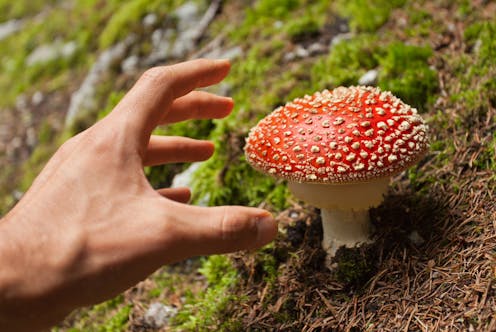'From Magic Mushrooms to Big Pharma' – a college course explores nature's medicine cabinet and different ways of healing
- Written by Heather McIlvaine-Newsad, Professor of Anthropology, Western Illinois University

We also examine how the pharmaceutical industry has[13] exploited Indigenous peoples’ ethnobotanical knowledge[14] and landscapes for monetary gain[15].
Using the Amazonian giant leaf frog, or kambô (Phyllomedusa bicolor[16]), as a case study, students learn that at least 15 Indigenous groups have long histories of using the frog’s secretion for its analgesic, antibiotic and wound-healing properties. Eleven patents related to P. bicolor have been granted[17] – all of them in rich countries. Indigenous people have not been compensated for their knowledge.
Why is this course relevant now?
The current generation of young people are open about mental health issues[18], and many people are looking for new ways to deal with anxiety, grief, PTSD and depression. My students can discuss their health concerns and learn about alternatives to what they may be accustomed to.
At this politically and racially polarized moment in the U.S., the course also provides the opportunity to discuss how racism, misogyny and discrimination against people of color[19] have influenced scientific research.
What’s a critical lesson from the course?
Over the course of the semester, students begin to recognize that there is no one right way of healing. More importantly, there is no one right way of being human. It is my hope that students leave seeing that everything is connected, integrally linked to humanity’s relationship to nature.
What materials does the course feature?
What will the course prepare students to do?
Studying how different cultures approach problems that plague all humans, like being sick and healing our ill, demonstrates to students that there are many ways the world over to solve problems. This course views different approaches not as a problem to be overcome but as a resource that can yield new ways of thinking and new opportunities – a definite advantage in the professional world. I hope students also learn to become advocates for their own health and well-being.
References
- ^ Uncommon Courses (theconversation.com)
- ^ I grew up to be an anthropologist (scholar.google.com)
- ^ ayahuasca and other medicines from the forest (doi.org)
- ^ legalization of cannabis in many states (mjbizdaily.com)
- ^ increased research (doi.org)
- ^ how “nontraditional” drugs can assist (doi.org)
- ^ addiction issues (doi.org)
- ^ Cannabis & Culture (www.wiu.edu)
- ^ many ways of knowing the world around us (doi.org)
- ^ ginger and turmeric can alleviate inflammation (doi.org)
- ^ reduce or even eliminate some epileptic seizures (doi.org)
- ^ GummyBone/iStock via Getty Images Plus (www.gettyimages.com)
- ^ pharmaceutical industry has (doi.org)
- ^ exploited Indigenous peoples’ ethnobotanical knowledge (www.northatlanticbooks.com)
- ^ and landscapes for monetary gain (doi.org)
- ^ Phyllomedusa bicolor (amphibiaweb.org)
- ^ Eleven patents related to P. bicolor have been granted (news.mongabay.com)
- ^ open about mental health issues (magazine.medlineplus.gov)
- ^ racism, misogyny and discrimination against people of color (doi.org)
- ^ Mark Abramson/The Washington Post via Getty Images (www.gettyimages.com)
Authors: Heather McIlvaine-Newsad, Professor of Anthropology, Western Illinois University

